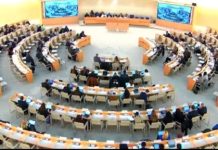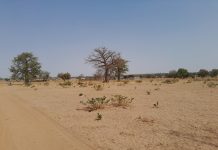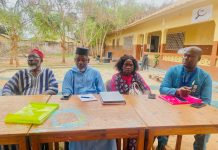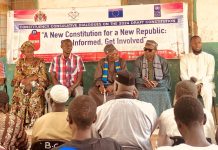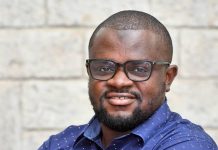Opinions adopted by the Working Group on Arbitrary Detention at its seventy-fourth session, 30 November – 4 December 2015
Opinion No. 50/2015 concerning Alhagie Abdoulie Ceesay (The Gambia)
- The Working Group on Arbitrary Detention was established in resolution 1991/42 of the Commission on Human Rights, which extended and clarified the Working Group’s mandate in its resolution 1997/50. The Human Rights Council assumed the mandate in its decision 1/102 and extended it for a three-year period in its resolution 15/18 of 30 September 2010. The mandate was extended for a further three years in resolution 24/7 of 26 September 2013.
- In accordance with its methods of work (A/HRC/30/69), on 27 August 2015 the Working Group transmitted a communication to the Government of The Gambia concerning Alhagie Abdoulie Ceesay. The Government has not replied to the communication. The State is a party to the International Covenant on Civil and Political Rights.
- The Working Group regards deprivation of liberty as arbitrary in the following cases:
(a) When it is clearly impossible to invoke any legal basis justifying the deprivation of liberty (as when a person is kept in detention after the completion of his sentence or despite an amnesty law applicable to him) (category I);
(b) When the deprivation of liberty results from the exercise of the rights or freedoms guaranteed by articles 7, 13, 14, 18, 19, 20 and 21 of the Universal Declaration of Human Rights and, insofar as States parties are concerned, by articles 12, 18, 19, 21, 22, 25, 26 and 27 of the International Covenant on Civil and Political Rights (category II);
(c) When the total or partial non-observance of the international norms relating to the right to a fair trial, established in the Universal Declaration of Human Rights and in the relevant international instruments accepted by the States concerned, is of such gravity as to give the deprivation of liberty an arbitrary character (category III);
(d) When asylum seekers, immigrants or refugees are subjected to prolonged administrative custody without the possibility of administrative or judicial review or remedy (category IV);
(e) When the deprivation of liberty constitutes a violation of international law for reasons of discrimination based on birth, national, ethnic or social origin, language, religion, economic condition, political or other opinion, gender, sexual orientation or disability or other status, that aims towards or can result in ignoring the equality of human rights (category V).
SUBMISSIONS
Communication from the source
- Mr. Alhagie Abdoulie Ceesay, 22 years old, is a national of the Republic of the Gambia. He is the managing director of a private radio station, Teranga FM, based in Sinchu Alagie, West Coast Region, The Gambia. Mr. Ceesay resides in Sinchu Alagie village, Kombo North, West Coast Region, The Gambia.
- According to the source, on 2 July 2015, Mr. Ceesay was arrested near the Teranga FM radio station by two officers from the National Intelligence Agency (NIA). The two officers were in plain clothes and did not present any arrest warrant at the time of the arrest. Mr. Ceesay was taken to an unknown place. The authorities who arrested him refused to disclose any information on the reasons for the arrest. Until his release on 13 July, Mr. Ceesay was held incommunicado and had no access to his family or any lawyer.
- On the night of 17 July 2015, Mr. Ceesay was again arrested along Kairaba Avenue, in the Serrekunda neighbourhood, Greater Banjul area. He was forced into a car by several officers from the NIA in plain clothes, only one of them in police uniform. Mr. Ceesay was arrested without a warrant and detained at the NIA headquarters in Banjul, which was reportedly not an official place of detention.
- On 20 July 2015, two NIA officers escorted Mr. Ceesay to his family house to pick up documents and his medication. On 23 July 2015, a person associated with Mr. Ceesay tried to visit him at the NIA headquarters. The person was told that Mr. Ceesay was detained there but he was not allowed to visit him. Until 4 August 2015, Mr. Ceesay was not allowed to receive any visit by his family or any lawyer.
- On 4 August 2015, Mr. Ceesay was brought before the Magistrate’s Court and initially charged with seditious intention, in violation of section 51(1)(d) of the Criminal Code. At the court, he managed to speak to his lawyer for few minutes. Mr. Ceesay’s lawyer submitted an application for bail, which was denied on the following day. Mr. Ceesay was detained at The Gambia Police Force Headquarters.
- On 5 August 2015, during the second hearing, Mr. Ceesay was remanded in custody by a judge. He was subsequently transferred to the Mile II central prison and kept in the maximum security wing there.
- On 11 August 2015, while in prison, Mr. Ceesay received a copy of a letter from the Attorney General to the High Court indicating that he was charged with “sedition”, based on section 52 (a) and (c) of the Criminal Code; and “publication of false news with intent to cause fear and alarm to the public”, in violation of section 59 (1) of the Criminal Code.
- On 18 August 2015 Mr. Ceesay was brought before the High Court regarding his bail application. On 19 August 2015, the bail application was rejected. 12. On 24 August 2015, a hearing on Mr. Ceesay’s case was held before the High Court. However, Mr. Ceesay’s lawyer was not informed about the court hearing. Coincidentally, 3 the lawyer of Mr. Ceesay was at the court on the same day thus she managed to represent him.
- Concern has been raised that Mr. Ceesay was subjected to torture during his detention, including during the first period of detention between 2 and 13 July 2015.
- The source submits that the detention of Mr. Ceesay falls under categories I, II and III as defined in the Methods of Work.
- From 2 to 13 July 2015 (12 days), Mr. Ceesay was held in an unknown location without access to his family or a lawyer. Between 18 July and 4 August 2015 (18 days), he was detained at the NIA headquarters, which is not an official place of detention. The source indicates that under section 19 (3) of the Constitution of The Gambia, “any person who is arrested or detained upon reasonable suspicion of his or her having committed or being about to commit a criminal offence under the law of The Gambia and who is not released shall be brought without undue delay before a court in any event within seventy two hours.” Consequently, the source submits that the detention of Mr. Ceesay between 5 and 13 July (9 days) and from 21 July to 4 August (15 days) were without any legal basis. The source argues that the detention of Mr. Ceesay during these two periods falls under category I given that there is “no legal basis to justify the deprivation of liberty”.
- The source further submits that the arrest and detention of Mr. Ceesay appear to be related to his profession as a journalist and result from the exercise of his right to freedom of opinion and expression, as guaranteed by article 19 of the Universal Declaration of Human rights (UDHR), and article 19 of the International Covenant on Civil and Political Rights (ICCPR). Thus the deprivation of liberty is arbitrary and it falls under category II.
- The source further submits that Mr. Ceesay has not been guaranteed the international norms of due process and guarantees to a fair trial during the period of his deprivation of liberty, in violation of articles 9 and 10 of the Universal Declaration of Human Rights and articles 9 and 14 of the International Covenant on Civil and Political Rights. The source argues that Mr. Ceesay was arrested twice without a warrant. He had been detained without charge and denied access to a lawyer until 4 August 2015 when he was brought before a court. In addition, his lawyer was not informed of the date of the court hearing which took place on 24 August 2015.
Response from the Government
- The communication was sent to the Government of The Gambia on 27 August 2015. The Government then had 60 days to respond. But by 27 October 2015 as stated in the communication, no response was received from the Government. This was not surprising because The Gambia seems to have developed a practice of non-cooperation with the special procedures: the Special Rapporteur for Human Rights Defenders recently regretted the failure of The Gambia to provide any substantive response to urgent appeals issued;1 and serious obstacles in the course of a joint country visit of the Special Rapporteur on Torture and the Special Rapporteur on Summary, Extrajudicial and Arbitrary Executions in November 2014 brought the mission to an early end. It is worth recalling that in August 2014, the Government had already unilaterally postponed that same mission. See Press Release dated 12 August 2014.
- Paragraph 16 of the Methods of Work (A/HRC/30/69) reads as follows: “Even if no reply has been received upon expiry of the time limit set, the Working Group may render an opinion on the basis of all the information it has obtained”. This provision means that the lack of response by a State does not prevent the Working Group from issuing an opinion. However, such silence does not mean that everything in the source should be considered as established. The Working Group must assess the prima facie reliability of the information provided by the source.
- In the present case, the information submitted by the source is detailed and coherent. In addition, the source has provided judicial documents from The Gambia which fully corroborates the facts as it reports them. Moreover, these facts are also confirmed by various other sources in the public domain. Finally the allegations here coincide with a pattern of abuses occurring in The Gambia which have been presented to the Human Rights Council in various processes.
- The failure of the Government to respond means that The Gambia has opted not to rebut the prima facie reliable information received from the source and the Working Group can only trust the source and proceeds on that basis. The Working Group therefore considers the facts as reported in the communication sent to the Government as established.
- The main argument of the source here is that there is an arbitrary detention under category II. The status of Mr. Ceesay as journalist is not in dispute. And the accusation against him is based on what he does as a journalist, exercising his right to freedom of expression and opinion protected in Articles 19 of the UDHR and the ICCPR. The Working Group is therefore of the view that this argument must succeed. The Working Group is further concerned by this crime of “sedition” which is used to deny the enjoyment of freedoms. The Government should reconsider its interpretation of that crime. The Working Group is available to assist the Government in that regard, as it has always done it for other United Nations Member States, through the constructive dialogue that a country visit permits.
- The source also argues that the current situation meets the requirements for category I of arbitrary detention. For this category, as stated above (para. 2), there is no legal basis for the detention. In this case, on two separate occasions, Mr. Ceesay was arrested without any notification of the charges against him for a period lasting beyond the 72 hours permitted in the domestic framework. Each of these instances was in violation of Articles 9 of the UDHR and the ICCPR. The Working Group is of the view that this is indeed category I arbitrary detention.
- The source finally argues that there are elements which should lead to category III of arbitrary detention. Indeed the facts are that in various occasions during the detention of Mr. Ceesay, he was not allowed to see any lawyer. This is in violation of his right to fair trial which includes the benefits of legal assistance and representation as provided in Principle 9 of the United Nations Basic Principles and Guidelines on Remedies and Procedures on the Right of Anyone Deprived of Their Liberty to Bring Proceedings Before a Court. In addition, there have been instances of failure to notify his lawyer of the charges against him or the court schedule, and it was only by accident that the lawyer managed to attend a hearing. It is a fundamental right of all criminal justice systems that the accused must be accorded a fair trial (Article 10 of the UDHR and Article 14 of the ICCPR) and 3 See among others: CCPR/CO/75/GMB paras. 11, 19-20; JUA 18/12/2012 GMB 2/2012; A/HRC/WG.6/20/GMB/3 esp. paras. 11, 14, 44-45, 53-55, 59, 79-82; A/HRC/WG.6/20/GMB/2 esp. paras. 43-45; A/HRC/28/NGO/157; A/HRC/28/NGO/170. ADVANCE UNEDITED VERSION A/HRC/WGAD/2015 5 failure in that regard negatively taints the overall process. The Working Group is therefore of the view that this constitutes an arbitrary detention under category III. 25. There is a universal prohibition against incommunicado detention and detention in places other than those dedicated to detention. Additionally, there is a presumption that they lead to practice of torture in violation of Article 7 of the ICCPR.4 In this case, Mr. Ceesay has been detained incommunicado from 2 to 13 July 2015 while from 18 July to 4 August 2015 he was detained at The Gambia Police Headquarters, which is not a detention place. The alleged risk of torture and mistreatment stated by the source is extremely likely, and should be further investigated through the appropriate special procedures. Disposition 26. In the light of the foregoing, the Working Group renders the following opinion: The deprivation of liberty of Mr. Alhagie Abdoulie Ceesay is arbitrary within categories II, I and III as per the definition provided in the Methods of Work.
- In consequence, the Working Group requests the Government of The Gambia to take the necessary steps to remedy the situation of Mr. Ceesay. Taking into account all the circumstances of the case, the Working Group is of view that the adequate remedy would be to immediately release Mr. Ceesay, to accord him an enforceable right to compensation and to ensure that freedom of opinion and expression is better protected.
- Finally, the Working Group refers the allegation of torture to the Special Rapporteur on torture for further investigations and appropriate measures. [Adopted on 4 December 2015]



